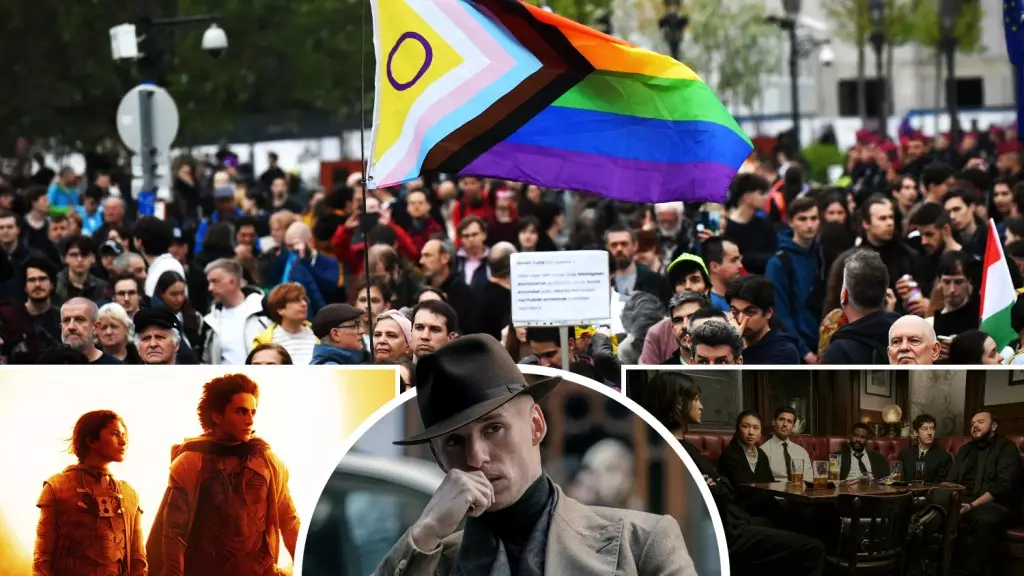In an era where the power of storytelling has risen to unprecedented heights, Hollywood faces an ethical conundrum that transcends financial gain. As the film industry continues to globalize, the tension between location choice and social responsibility has never been more pronounced. The recent surge of anti-LGBTQ legislation in Hungary serves as a critical test for filmmakers and studios navigating this complex landscape. With a myriad of productions currently filming in Budapest, Hollywood’s silence on the matter casts a long shadow, signaling a moral dilemma that echoes the controversies of yesteryears, such as North Carolina’s infamous “bathroom bill.”
The Historical Context: Lessons from North Carolina
In 2016, Hollywood took a decisive stand against North Carolina’s HB 2, a law perceived as discriminatory toward transgender individuals. The industry’s reaction was swift, with major studios like Netflix relocating significant productions to other states in protest. Such actions created a seismic shift in how we view corporations’ roles in politics—specifically, their ability to influence social change through economic power. However, the fallout from that incident also leads us to question, was the boycott effective? Or simply a temporary measure that failed to produce lasting change?
Now, filmmakers are faced with a similar landscape in Hungary, where populist policies enacted under Prime Minister Viktor Orbán have accelerated the erosion of LGBTQ rights, including amendments that restrict public gatherings and ban the promotion of LGBTQ themes to minors. This raises critical questions: Should studios withdraw their support from a country that actively discriminates against a marginalized group? Or does financial incentive outweigh ethical considerations?
Hungary: A Double-Edged Sword
Hungary has positioned itself as a prime filming location within Europe, bolstered by attractive tax incentives and a well-trained local crew. With a tax credit estimated at around 30% and immediate payout terms, the country appeals to filmmakers who prioritize economic pragmatism. It’s a common understanding among producers that significant legislation would have to occur before Hollywood would even consider fleeing the nation. However, this immediate financial allure belies a troubling moral compromise.
Productions like “Dune: Part Two” and “The Brutalist” have already embraced Hungary’s film-friendly landscape, with additional projects—including popular franchises and high-profile films—currently updating their shooting schedules. While the studios involved have remained tight-lipped in light of new anti-LGBTQ laws, they are essentially endorsing an environment that undermines human rights in the name of profit.
The Silence Speaks Volumes
Hollywood’s muted response to the unfolding situation in Hungary is disheartening. It signifies a troubling pattern: the prioritization of economic incentives over ethical stands. The absence of a collective industry statement, or outright withdrawal from Hungary, raises eyebrows regarding the authenticity of Hollywood’s commitment to progressive values. One might argue that a repeat of the North Carolina boycotts could incite fear within the industry that similar actions will have a backlash, but that fear doesn’t negate responsibility.
The larger implications also resonate with how Hollywood’s historical responses to discrimination continue to evolve. The industry has long wielded its influence as a platform for social change, yet when confronted with a scenario that mirrors domestically felt discrimination, there appears to be a hesitance to act robustly. This creates a dissonance between the values Hollywood espouses and the realities of its operational conduct.
The Road Ahead: Social Responsibility vs. Financial Gain
As the landscape in Hungary continues to shift, it raises a pivotal question for filmmakers, creators, and actors: What price are you willing to pay for your art? The ethical considerations of supporting a regime that intentionally targets LGBTQ communities are significant. While budgets and profit margins are understandably critical for studios, the long-term harm caused by enabling oppressive systems through economic engagement cannot be easily dismissed.
Top-tier talent might soon find themselves grappling with their collaborations in Hungary while weighing their own values against their responsibilities as public figures. If stars like Timothée Chalamet or Zendaya decide not to support such environments, it might signal a transformative shift within the industry, enabling artists to set higher bars for not only artistic expression but also the ethical implications of where that art is created.
Hollywood stands at a crossroads. It can either choose to endorse an environment that champions profits over principles or push toward a future that values human rights alongside cinematic ambition. The unfolding events in Hungary should serve as a clarion call for the industry, reminding it that storytelling thrives where freedom and inclusivity exist, and that the moral dimensions of filmmaking must become inseparable from its financial aspects.

